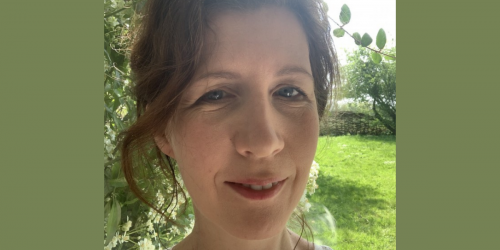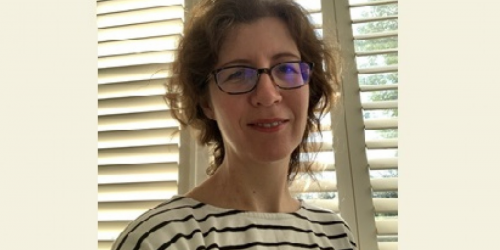
Lucy Fellow and DoS publishes on support and treatment for people with Prader-Willi Syndrome
Dr Elizabeth Fistein’s article was published in ScienceDirect’s International Journal of Law and Psychiatry
Elizabeth answers a series of questions about her career and what it means to be joining the Lucy community
How do you feel about joining the Lucy community and what does it mean to you?
I’m delighted to be joining the Lucy community - it’s a great honour to be asked. I like the atmosphere of the college, which is friendly and relaxed, full of people who immediately make me feel at ease. It’s wonderful to be a part of a community of people from such a range of backgrounds and from all around the globe, who are doing fascinating work and are keen to share their experiences with others.
What do you think is the most important thing you will bring to the team?
Given the exciting changes that the college has planned, I’m going to cheat and say that there are two things I will bring to the team. Firstly, as someone whose parents hadn’t been to university themselves and who went to a school where only a quarter of pupils stayed on to do A-levels, let alone apply to university, I am firmly committed to widening participation. I hope that I can serve as a role model to students and help to anticipate and address the challenges that some of them may be facing. Secondly, having been part of the medical education team at the Clinical School since 2008, during which time we have expanded from admitting around 150 students per year to now admitting almost 300, I bring experience of how to adjust a curriculum and teaching methods in order to maintain quality while accommodating lots more students.
How exactly do you help and support students?
As a DoS in Clinical Medicine, I am a link between the College and the Clinical School at Addenbrooke’s Hospital. My job is to make sure medical students are able to get the most they can out of the patient-facing part of their studies: when they are on placement in hospitals and GP surgeries, or learning clinical skills and professional responsibilities in the classroom. For many medical students, this is the most exciting part of their training, where they really begin to feel like they are becoming doctors. It can also take time to adjust to a new way of learning in an unfamiliar environment, so part of my job is to help students to make that transition. I will meet new students at the beginning of the course, so that we can get to know each other. I will make sure teaching is available in College, to support and enhance the learning taking place on placements. I’m also someone that students can come to for advice and support - something we all need from time to time.
What will be your priorities in your new role?
I think it will be important to find ways of keeping what is good about medicine at Lucy, and multiplying that so that more people can experience it! I’m looking forward to getting to know members of the community and working with them to make sure their ideas and talents are used to help our medical students become they best doctors they can be.
What motivated you to first study and pursue a career in clinical medicine?
For me, the most attractive thing about a career in medicine is the variety and flexibility of the work. As someone who enjoyed sciences and humanities at school, I wanted to study a subject with elements of both. When I was 17, my mum (who was training to be mental health nurse) took me to see the large psychiatric hospital where she was on placement. This was a real eye-opener for me - and inspired me to train as a psychiatrist and work to improve the lives of people affected by mental ill-health. Since then I’ve had opportunities to immerse myself in academic studies in a range of fascinating fields from neurosciences to social sciences, law and philosophy, and to apply what I’ve learned to supporting a group of people who face the challenge of living with severe mental illness. Since getting involved in medical education, I’ve also had the satisfaction of supporting the development of new clinical students, watching them transform into doctors and, increasingly, return to help me teach the next generation. I think the thing that keeps me going is the people that I’ve met along the way: teachers, patients, colleagues and students. Together we form a team that makes a real difference to people’s lives.
About Elizabeth
Elizabeth is a Fellow and Director of Clinical Studies at Lucy Cavendish. She works in the School of Clinical Medicine, where she is responsible for delivery of the Professional Responsibilities curriculum (ethics & law, reflective practice, teaching skills, leadership & management, multi-professional team-working, patient safety and personal development). She is a Medical Member of the First Tier Tribunal (Mental Health), having previously worked as a Consultant Psychiatrist in Cambridgeshire & Peterborough NHS Foundation Trust where she specialised in rehabilitation psychiatry for people with severe and enduring mental ill-health. She also sits on the Psychology Research Ethics Committee, the University Research Ethics Committee and the Approved Clinicians appointment panel for the Midland & East of England, and is an Associate of the Centre for Law, Medicine & Life Sciences in the Faculty of Law.
Research Interests
Elizabeth’s research interests are focussed on two main areas: the role of consent, capacity and coercion in medical treatment, and medical education. For more details of publications see here

Dr Elizabeth Fistein’s article was published in ScienceDirect’s International Journal of Law and Psychiatry

Elizabeth’s co-authored paper describes a teaching project aimed at first year medical students

Norfilza has been promoted to Leader of Cluster for Health and Advanced Medicine